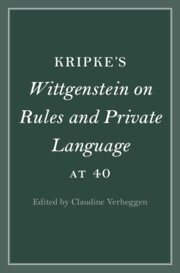Book contents
- Kripke’s Wittgenstein on Rules and Private Language at 40
- Cambridge Philosophical Anniversaries
- Kripke’s Wittgenstein on Rules and Private Language at 40
- Copyright page
- Dedication
- Contents
- Contributors
- Acknowledgments
- Introduction
- 1 Kripke’s Wittgenstein’s Skepticism about Rules and Meaning
- 2 Putting Wittgenstein Back into Kripkenstein:
- 3 Answering Kripke’s Skeptic
- 4 Wittgensteinean Notions of Uniformity and Kripkensteinean Skepticism
- 5 Wittgenstein’s Naturalism and the Skeptical Paradox
- 6 Kripke and Wittgenstein on Rules and Meaning
- 7 Semantic Normativity, Properly So Called
- 8 What Is the Skeptical Problem? Wittgenstein’s Response to Kripke
- 9 How Not to Brush Questions under the Rug
- 10 Quadders and Zombies
- 11 Communitarianism, Interpersonalism, and Individualism in Kripke’s “Skeptical Solution”
- 12 “Considered in Isolation”
- 13 The Meaning of Meaning Ascriptions
- Bibliography
- Index
12 - “Considered in Isolation”
Published online by Cambridge University Press: 22 February 2024
- Kripke’s Wittgenstein on Rules and Private Language at 40
- Cambridge Philosophical Anniversaries
- Kripke’s Wittgenstein on Rules and Private Language at 40
- Copyright page
- Dedication
- Contents
- Contributors
- Acknowledgments
- Introduction
- 1 Kripke’s Wittgenstein’s Skepticism about Rules and Meaning
- 2 Putting Wittgenstein Back into Kripkenstein:
- 3 Answering Kripke’s Skeptic
- 4 Wittgensteinean Notions of Uniformity and Kripkensteinean Skepticism
- 5 Wittgenstein’s Naturalism and the Skeptical Paradox
- 6 Kripke and Wittgenstein on Rules and Meaning
- 7 Semantic Normativity, Properly So Called
- 8 What Is the Skeptical Problem? Wittgenstein’s Response to Kripke
- 9 How Not to Brush Questions under the Rug
- 10 Quadders and Zombies
- 11 Communitarianism, Interpersonalism, and Individualism in Kripke’s “Skeptical Solution”
- 12 “Considered in Isolation”
- 13 The Meaning of Meaning Ascriptions
- Bibliography
- Index
Summary
Chapter 2 of Wittgenstein on Rules and Private Language argues that there are no facts about what anyone means by their words, so meaning is a fiction. But some fictions are useful, and Chapter 3 explains why this one is. One side-effect of that explanation is supposed to be the “Private and solitary language argument,” which says that we cannot, or at least cannot usefully, ascribe meaning to an individual “considered in isolation”; it thereby reveals something essentially communitarian about meaning.
This chapter briefly defends that fictionalist reading of Kripke’s great work before arguing at more length that no communitarian conclusion follows. Even if semantic ascriptions are all false, they may still be useful, even when made by, or applied to, or addressed by, an individual “considered in isolation”– whatever exactly this turns out to mean.
- Type
- Chapter
- Information
- Kripke's Wittgenstein on Rules and Private Language at 40 , pp. 220 - 237Publisher: Cambridge University PressPrint publication year: 2024

